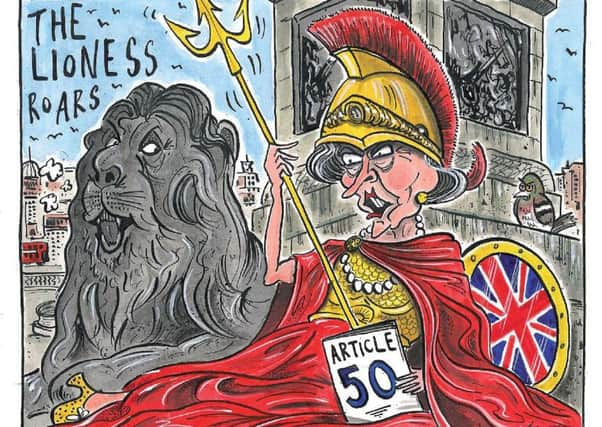Bernard Ingham: Britannia sets sail, leaving EU's sinking ship behind


It is unlikely that Remainers such as Michael Heseltine will compare it to rats leaving a sinking ship. After all, he and his ilk think the 60-year-old EU is simply wonderful. He does not yet seem to have realised that the Germans have effectively been running the show for years.
Remainers may feel that the British people are ratting, but the fact is that the EU is failing and is doomed so long as Brussels thinks that more rather than less integration is required to make it work. The single currency has fractured the entire institution because it has created an unhealthy North/South divide and saddled some states with crippling debts, unemployment and relative poverty.
Advertisement
Hide AdAdvertisement
Hide AdIt is a classic example of an international organisation failing to recognise its fault in trying to create a federal Europe long before most states would even contemplate it.
It was told what was wrong as long ago as 1988 when Margaret Thatcher in Bruges advised it to become a looser and wider group of co-operating states instead of a dictatorial bureaucracy bent on federalism. Brussels has so far turned a deaf ear to what is uncongenial to it, though its 60th anniversary communiqué dropped at least for this Brexit moment the slogan “ever closer union”.
So, how should Theresa May go about her historic mission?
I have some experience of EU negotiations, having attended 31 consecutive European summits. Indeed, I was there from the start in Dublin in 1979 of Thatcher’s long renegotiation of our national contribution. She was compared to a fishwife for demanding her money back.
Eventually, after well over four years’ dogged persistence, she settled for what was called two-thirds of a loaf when Francois Mitterrand decided he had had enough of the seemingly endless negotiation.
Advertisement
Hide AdAdvertisement
Hide AdIt was a frustrating four years since heads of state and government tried to play our mission into the long grass or shove it down the agenda. Thatcher used to be magnificent in her shuddering contempt for “those men, so unbusinesslike” who anecdoted the night away at summit dinners instead of facing the issue.
This time there is a two-year limit on the haggling, but France particularly can be guaranteed to play it long if it thinks it can screw us.
This means that Mrs May must play the Ice Maiden and start as she means to go on. She should make six points:
Whether the EU likes it or not, Britain is on its way out by 2019 and will not be diverted if there is no agreement.
Advertisement
Hide AdAdvertisement
Hide AdTo put it bluntly, Brussels can whistle for its £51bn exit fee; the British people will not put up with such extortion.
We shall not be impressed by attempts to stall serious discussions; we intend to negotiate our exit in good faith and the EU will enhance its reputation only for vindictiveness if it does not respond in a mature way.
We believe that no deal is better than a bad deal and you need seriously to examine the interests of EU commerce and industry in securing a good deal, given the balance of UK/EU trade.
We are ready to guarantee the rights of EU citizens legally living in the UK provided the EU reciprocates over UK citizens legally resident in the EU.
Advertisement
Hide AdAdvertisement
Hide AdWe are not leaving Europe – we shall, for example, remain a key member of Nato’s defence – but merely the EU because it is in truth a bureaucracy, not a democracy, that never seems to learn from its great mistakes – notably, federalism and the introduction of a single currency and freedom of movement regardless of terrorism and member-states’ ability to cope with major influxes of immigrants.
Mrs May might usefully make the point that she has spoken bluntly at the outset because Britain is not at some crossroads. It knows where it is going.
Its objective is to recover its sovereignty, to fashion its own laws and to become a successful, free trading society that is the envy of the world.
She might add: “We understand why Brussels is apparently reluctant to see Britain leave without penalty. You want to discourage other states from departing. But that fear reveals your weakness. You are afraid the whole pack of cards will come tumbling down. The remedy is in your hands: they call it reform.”